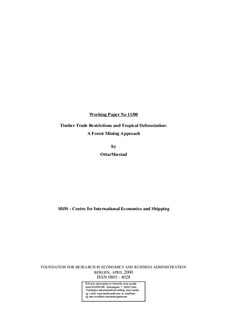| dc.description.abstract | Timber trade restrictions have been proposed as a means to reducing tropical deforestation. This paper analyses the consequences of such trade interventions, emphasising the effects on logging behaviour and the allocation of land between forestry and alternative activities (e.g., agriculture). Tropical forestry is modelled as the mining of a heterogeneous, non-renewable resource. Two different harvesting procedures – sequential and simultaneous harvest – are examined. The analysis suggests that logging will be reduced if timber trade restrictions reduce the log price equally for all tree qualities. But if the price reduction is non-uniform, logging may increase in some fields. In fact, total logging may increase as well. It is also shown that timber trade restrictions do not necessarily promote the conversion of forestland to alternative uses. Key words: Tropical forest, deforestation, mining, trade policy. JEL classification: F13, Q23, Q24, Q28. | en |
